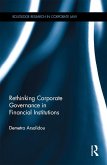39,95 €
39,95 €
inkl. MwSt.
Sofort per Download lieferbar

20 °P sammeln
39,95 €
Als Download kaufen

39,95 €
inkl. MwSt.
Sofort per Download lieferbar

20 °P sammeln
Jetzt verschenken
Alle Infos zum eBook verschenken
39,95 €
inkl. MwSt.
Sofort per Download lieferbar
Alle Infos zum eBook verschenken

20 °P sammeln
- Format: PDF
- Merkliste
- Auf die Merkliste
- Bewerten Bewerten
- Teilen
- Produkt teilen
- Produkterinnerung
- Produkterinnerung

Bitte loggen Sie sich zunächst in Ihr Kundenkonto ein oder registrieren Sie sich bei
bücher.de, um das eBook-Abo tolino select nutzen zu können.
Hier können Sie sich einloggen
Hier können Sie sich einloggen
Sie sind bereits eingeloggt. Klicken Sie auf 2. tolino select Abo, um fortzufahren.

Bitte loggen Sie sich zunächst in Ihr Kundenkonto ein oder registrieren Sie sich bei bücher.de, um das eBook-Abo tolino select nutzen zu können.
This book critically examines the concept of 'embeddedness': the core concept of an Economic Sociology of Law (ESL).
- Geräte: PC
- mit Kopierschutz
- eBook Hilfe
Andere Kunden interessierten sich auch für
![An Economic Sociology of Law Reimagined (eBook, ePUB) An Economic Sociology of Law Reimagined (eBook, ePUB)]() Clare WilliamsAn Economic Sociology of Law Reimagined (eBook, ePUB)39,95 €
Clare WilliamsAn Economic Sociology of Law Reimagined (eBook, ePUB)39,95 €![The Routledge Handbook of Law and Society (eBook, PDF) The Routledge Handbook of Law and Society (eBook, PDF)]() The Routledge Handbook of Law and Society (eBook, PDF)44,95 €
The Routledge Handbook of Law and Society (eBook, PDF)44,95 €![Rethinking Corporate Governance in Financial Institutions (eBook, PDF) Rethinking Corporate Governance in Financial Institutions (eBook, PDF)]() Demetra ArsalidouRethinking Corporate Governance in Financial Institutions (eBook, PDF)31,95 €
Demetra ArsalidouRethinking Corporate Governance in Financial Institutions (eBook, PDF)31,95 €![Company Directors' Responsibilities to Creditors (eBook, PDF) Company Directors' Responsibilities to Creditors (eBook, PDF)]() Andrew KeayCompany Directors' Responsibilities to Creditors (eBook, PDF)62,95 €
Andrew KeayCompany Directors' Responsibilities to Creditors (eBook, PDF)62,95 €![Privatization, Vulnerability, and Social Responsibility (eBook, PDF) Privatization, Vulnerability, and Social Responsibility (eBook, PDF)]() Privatization, Vulnerability, and Social Responsibility (eBook, PDF)57,95 €
Privatization, Vulnerability, and Social Responsibility (eBook, PDF)57,95 €![Critical Company Law (eBook, PDF) Critical Company Law (eBook, PDF)]() Lorraine TalbotCritical Company Law (eBook, PDF)46,95 €
Lorraine TalbotCritical Company Law (eBook, PDF)46,95 €![Shareholder-driven Corporate Governance (eBook, PDF) Shareholder-driven Corporate Governance (eBook, PDF)]() Anita Indira AnandShareholder-driven Corporate Governance (eBook, PDF)63,95 €
Anita Indira AnandShareholder-driven Corporate Governance (eBook, PDF)63,95 €-
-
-
This book critically examines the concept of 'embeddedness': the core concept of an Economic Sociology of Law (ESL).
Dieser Download kann aus rechtlichen Gründen nur mit Rechnungsadresse in A, B, BG, CY, CZ, D, DK, EW, E, FIN, F, GR, HR, H, IRL, I, LT, L, LR, M, NL, PL, P, R, S, SLO, SK ausgeliefert werden.
Produktdetails
- Produktdetails
- Verlag: Taylor & Francis eBooks
- Seitenzahl: 206
- Erscheinungstermin: 14. Dezember 2022
- Englisch
- ISBN-13: 9781000438963
- Artikelnr.: 66797974
- Verlag: Taylor & Francis eBooks
- Seitenzahl: 206
- Erscheinungstermin: 14. Dezember 2022
- Englisch
- ISBN-13: 9781000438963
- Artikelnr.: 66797974
- Herstellerkennzeichnung Die Herstellerinformationen sind derzeit nicht verfügbar.
Clare Williams is an ESRC¿SeNSS funded Postdoctoral Research Fellow at Kent Law School, University of Kent, UK.
Preface
Acknowledgements and return journeys
Visualizing socio-legal frames, concepts, and methods
1 Doing, talking, and thinking (and why we're not getting it right)
Crashes, crises, catastrophes
Doing, talking, and thinking
The law and the economy don't really exist
PS: Nor does society
How metaphors use us
Constructing reality
Introducing homo juridicus and homo economicus
An ongoing conceptual commitment to embeddedness
Introducing an economic sociology of law (ESL): the home of embeddedness
The career of embeddedness in ESL and two conceptual conundrums
Embeddedness in academic literature: drawing parallels and drawing
conclusions
Introducing our "guide" personas: Ann, Polly, and Lillian
Bibliography
2 Introducing an economic sociology of law
What is an economic sociology of law (ESL)?
The role of economic sociology of law: responding to disciplinarity
The intellectual heritage of ESL: economic sociology and socio-legal
scholarship
Socio-legal heritage
Economic sociology heritage
"Black boxes" and taxonomies
Text; subtext; context
Empirical; conceptual; normative
Econo-socio-legal
Instrumental; affective; belief-based; traditional
Micro; meso; macro; meta
Writing the rules of the game: indicators as technologies of governance
ESL is (currently) a pseudo-constructivist lens: boundaries and borderlands
Bibliography
3 Embeddedness: A biography of a concept
Embeddedness: the origins
Talking about embeddedness
Karl Polanyi's always (or never) embedded market
The "accidental" revival of embeddedness
Critiques of embeddedness
Critiques of macro-level embeddedness
Critiques of micro-level embeddedness
Reconciling macro- and micro-level embeddedness?
Reconciling the implications: cognitive and normative embeddedness
How might we make embeddedness more consistent?
Embedded liberalism
Embedded autonomy
Reconciling the insights?
The embeddedness conundrum is reinvented
Bibliography
4 Embeddedness: The internal inconsistencies
The internal inconsistency of embeddedness: "what are we talking about?"
Block's interpretation of Polanyian embeddedness
Dale's interpretation of Polanyian embeddedness
Doughnut Economics versus The Econocracy
Doughnut Economics
The Econocracy
Emblematic of a wider approach
What is embedded? And in what?
Bibliography
5 Embeddedness: The external conceptual incompatibilities
How we tend to think (our default conceptual tools)
How we might think differently (challenging default conceptual tools)
Thinking about embeddedness as a black box
Proposing an alternative ESL lens: beyond embeddedness
Shift 1: from the actor to their interaction
Trust is important in understanding interactions
Shift 2: embeddedness to feedback loops
Understanding feedback loops through performativity
Exploring the performativity of law and economics with a thought experiment
Beyond homo economicus-juridicus?
Bibliography
6 Beyond embeddedness: The next steps
What remains of ESL without its core concept of embeddedness?
Lingering questions about an ESL lens
What, where, or who is "the social"?
But "how much?": the "sociological fallacy"
Removing the core concept: what is left?
What's in a name? Linguistic limitations
Clean models or dirty hands?
ESL, politics, and power: can an ESL lens ever be apolitical?
Responding to crashes, crises, catastrophes
Our conceptual commitment to embeddedness continues
Shoehorning concepts into categories: Happy the Elephant, Chucho the Bear,
and their friends
Shoehorning concepts into categories: COVID versus the economy?
Rebalancing voices and values: becoming 'homo sociologicus'?
"Happy" Bhutan
"Sustainable" Oslo
Framing the future? Rebalancing voices and values
Moving beyond embeddedness?
Bibliography
Epilogue: Notes about the characters
Index
Acknowledgements and return journeys
Visualizing socio-legal frames, concepts, and methods
1 Doing, talking, and thinking (and why we're not getting it right)
Crashes, crises, catastrophes
Doing, talking, and thinking
The law and the economy don't really exist
PS: Nor does society
How metaphors use us
Constructing reality
Introducing homo juridicus and homo economicus
An ongoing conceptual commitment to embeddedness
Introducing an economic sociology of law (ESL): the home of embeddedness
The career of embeddedness in ESL and two conceptual conundrums
Embeddedness in academic literature: drawing parallels and drawing
conclusions
Introducing our "guide" personas: Ann, Polly, and Lillian
Bibliography
2 Introducing an economic sociology of law
What is an economic sociology of law (ESL)?
The role of economic sociology of law: responding to disciplinarity
The intellectual heritage of ESL: economic sociology and socio-legal
scholarship
Socio-legal heritage
Economic sociology heritage
"Black boxes" and taxonomies
Text; subtext; context
Empirical; conceptual; normative
Econo-socio-legal
Instrumental; affective; belief-based; traditional
Micro; meso; macro; meta
Writing the rules of the game: indicators as technologies of governance
ESL is (currently) a pseudo-constructivist lens: boundaries and borderlands
Bibliography
3 Embeddedness: A biography of a concept
Embeddedness: the origins
Talking about embeddedness
Karl Polanyi's always (or never) embedded market
The "accidental" revival of embeddedness
Critiques of embeddedness
Critiques of macro-level embeddedness
Critiques of micro-level embeddedness
Reconciling macro- and micro-level embeddedness?
Reconciling the implications: cognitive and normative embeddedness
How might we make embeddedness more consistent?
Embedded liberalism
Embedded autonomy
Reconciling the insights?
The embeddedness conundrum is reinvented
Bibliography
4 Embeddedness: The internal inconsistencies
The internal inconsistency of embeddedness: "what are we talking about?"
Block's interpretation of Polanyian embeddedness
Dale's interpretation of Polanyian embeddedness
Doughnut Economics versus The Econocracy
Doughnut Economics
The Econocracy
Emblematic of a wider approach
What is embedded? And in what?
Bibliography
5 Embeddedness: The external conceptual incompatibilities
How we tend to think (our default conceptual tools)
How we might think differently (challenging default conceptual tools)
Thinking about embeddedness as a black box
Proposing an alternative ESL lens: beyond embeddedness
Shift 1: from the actor to their interaction
Trust is important in understanding interactions
Shift 2: embeddedness to feedback loops
Understanding feedback loops through performativity
Exploring the performativity of law and economics with a thought experiment
Beyond homo economicus-juridicus?
Bibliography
6 Beyond embeddedness: The next steps
What remains of ESL without its core concept of embeddedness?
Lingering questions about an ESL lens
What, where, or who is "the social"?
But "how much?": the "sociological fallacy"
Removing the core concept: what is left?
What's in a name? Linguistic limitations
Clean models or dirty hands?
ESL, politics, and power: can an ESL lens ever be apolitical?
Responding to crashes, crises, catastrophes
Our conceptual commitment to embeddedness continues
Shoehorning concepts into categories: Happy the Elephant, Chucho the Bear,
and their friends
Shoehorning concepts into categories: COVID versus the economy?
Rebalancing voices and values: becoming 'homo sociologicus'?
"Happy" Bhutan
"Sustainable" Oslo
Framing the future? Rebalancing voices and values
Moving beyond embeddedness?
Bibliography
Epilogue: Notes about the characters
Index
Preface
Acknowledgements and return journeys
Visualizing socio-legal frames, concepts, and methods
1 Doing, talking, and thinking (and why we're not getting it right)
Crashes, crises, catastrophes
Doing, talking, and thinking
The law and the economy don't really exist
PS: Nor does society
How metaphors use us
Constructing reality
Introducing homo juridicus and homo economicus
An ongoing conceptual commitment to embeddedness
Introducing an economic sociology of law (ESL): the home of embeddedness
The career of embeddedness in ESL and two conceptual conundrums
Embeddedness in academic literature: drawing parallels and drawing conclusions
Introducing our "guide" personas: Ann, Polly, and Lillian
Bibliography
2 Introducing an economic sociology of law
What is an economic sociology of law (ESL)?
The role of economic sociology of law: responding to disciplinarity
The intellectual heritage of ESL: economic sociology and socio-legal scholarship
Socio-legal heritage
Economic sociology heritage
"Black boxes" and taxonomies
Text; subtext; context
Empirical; conceptual; normative
Econo-socio-legal
Instrumental; affective; belief-based; traditional
Micro; meso; macro; meta
Writing the rules of the game: indicators as technologies of governance
ESL is (currently) a pseudo-constructivist lens: boundaries and borderlands
Bibliography
3 Embeddedness: A biography of a concept
Embeddedness: the origins
Talking about embeddedness
Karl Polanyi's always (or never) embedded market
The "accidental" revival of embeddedness
Critiques of embeddedness
Critiques of macro-level embeddedness
Critiques of micro-level embeddedness
Reconciling macro- and micro-level embeddedness?
Reconciling the implications: cognitive and normative embeddedness
How might we make embeddedness more consistent?
Embedded liberalism
Embedded autonomy
Reconciling the insights?
The embeddedness conundrum is reinvented
Bibliography
4 Embeddedness: The internal inconsistencies
The internal inconsistency of embeddedness: "what are we talking about?"
Block's interpretation of Polanyian embeddedness
Dale's interpretation of Polanyian embeddedness
Doughnut Economics versus The Econocracy
Doughnut Economics
The Econocracy
Emblematic of a wider approach
What is embedded? And in what?
Bibliography
5 Embeddedness: The external conceptual incompatibilities
How we tend to think (our default conceptual tools)
How we might think differently (challenging default conceptual tools)
Thinking about embeddedness as a black box
Proposing an alternative ESL lens: beyond embeddedness
Shift 1: from the actor to their interaction
Trust is important in understanding interactions
Shift 2: embeddedness to feedback loops
Understanding feedback loops through performativity
Exploring the performativity of law and economics with a thought experiment
Beyond homo economicus-juridicus?
Bibliography
6 Beyond embeddedness: The next steps
What remains of ESL without its core concept of embeddedness?
Lingering questions about an ESL lens
What, where, or who is "the social"?
But "how much?": the "sociological fallacy"
Removing the core concept: what is left?
What's in a name? Linguistic limitations
Clean models or dirty hands?
ESL, politics, and power: can an ESL lens ever be apolitical?
Responding to crashes, crises, catastrophes
Our conceptual commitment to embeddedness continues
Shoehorning concepts into categories: Happy the Elephant, Chucho the Bear, and their friends
Shoehorning concepts into categories: COVID versus the economy?
Rebalancing voices and values: becoming 'homo sociologicus'?
"Happy" Bhutan
"Sustainable" Oslo
Framing the future? Rebalancing voices and values
Moving beyond embeddedness?
Bibliography
Epilogue: Notes about the characters
Index
Acknowledgements and return journeys
Visualizing socio-legal frames, concepts, and methods
1 Doing, talking, and thinking (and why we're not getting it right)
Crashes, crises, catastrophes
Doing, talking, and thinking
The law and the economy don't really exist
PS: Nor does society
How metaphors use us
Constructing reality
Introducing homo juridicus and homo economicus
An ongoing conceptual commitment to embeddedness
Introducing an economic sociology of law (ESL): the home of embeddedness
The career of embeddedness in ESL and two conceptual conundrums
Embeddedness in academic literature: drawing parallels and drawing conclusions
Introducing our "guide" personas: Ann, Polly, and Lillian
Bibliography
2 Introducing an economic sociology of law
What is an economic sociology of law (ESL)?
The role of economic sociology of law: responding to disciplinarity
The intellectual heritage of ESL: economic sociology and socio-legal scholarship
Socio-legal heritage
Economic sociology heritage
"Black boxes" and taxonomies
Text; subtext; context
Empirical; conceptual; normative
Econo-socio-legal
Instrumental; affective; belief-based; traditional
Micro; meso; macro; meta
Writing the rules of the game: indicators as technologies of governance
ESL is (currently) a pseudo-constructivist lens: boundaries and borderlands
Bibliography
3 Embeddedness: A biography of a concept
Embeddedness: the origins
Talking about embeddedness
Karl Polanyi's always (or never) embedded market
The "accidental" revival of embeddedness
Critiques of embeddedness
Critiques of macro-level embeddedness
Critiques of micro-level embeddedness
Reconciling macro- and micro-level embeddedness?
Reconciling the implications: cognitive and normative embeddedness
How might we make embeddedness more consistent?
Embedded liberalism
Embedded autonomy
Reconciling the insights?
The embeddedness conundrum is reinvented
Bibliography
4 Embeddedness: The internal inconsistencies
The internal inconsistency of embeddedness: "what are we talking about?"
Block's interpretation of Polanyian embeddedness
Dale's interpretation of Polanyian embeddedness
Doughnut Economics versus The Econocracy
Doughnut Economics
The Econocracy
Emblematic of a wider approach
What is embedded? And in what?
Bibliography
5 Embeddedness: The external conceptual incompatibilities
How we tend to think (our default conceptual tools)
How we might think differently (challenging default conceptual tools)
Thinking about embeddedness as a black box
Proposing an alternative ESL lens: beyond embeddedness
Shift 1: from the actor to their interaction
Trust is important in understanding interactions
Shift 2: embeddedness to feedback loops
Understanding feedback loops through performativity
Exploring the performativity of law and economics with a thought experiment
Beyond homo economicus-juridicus?
Bibliography
6 Beyond embeddedness: The next steps
What remains of ESL without its core concept of embeddedness?
Lingering questions about an ESL lens
What, where, or who is "the social"?
But "how much?": the "sociological fallacy"
Removing the core concept: what is left?
What's in a name? Linguistic limitations
Clean models or dirty hands?
ESL, politics, and power: can an ESL lens ever be apolitical?
Responding to crashes, crises, catastrophes
Our conceptual commitment to embeddedness continues
Shoehorning concepts into categories: Happy the Elephant, Chucho the Bear, and their friends
Shoehorning concepts into categories: COVID versus the economy?
Rebalancing voices and values: becoming 'homo sociologicus'?
"Happy" Bhutan
"Sustainable" Oslo
Framing the future? Rebalancing voices and values
Moving beyond embeddedness?
Bibliography
Epilogue: Notes about the characters
Index
Preface
Acknowledgements and return journeys
Visualizing socio-legal frames, concepts, and methods
1 Doing, talking, and thinking (and why we're not getting it right)
Crashes, crises, catastrophes
Doing, talking, and thinking
The law and the economy don't really exist
PS: Nor does society
How metaphors use us
Constructing reality
Introducing homo juridicus and homo economicus
An ongoing conceptual commitment to embeddedness
Introducing an economic sociology of law (ESL): the home of embeddedness
The career of embeddedness in ESL and two conceptual conundrums
Embeddedness in academic literature: drawing parallels and drawing
conclusions
Introducing our "guide" personas: Ann, Polly, and Lillian
Bibliography
2 Introducing an economic sociology of law
What is an economic sociology of law (ESL)?
The role of economic sociology of law: responding to disciplinarity
The intellectual heritage of ESL: economic sociology and socio-legal
scholarship
Socio-legal heritage
Economic sociology heritage
"Black boxes" and taxonomies
Text; subtext; context
Empirical; conceptual; normative
Econo-socio-legal
Instrumental; affective; belief-based; traditional
Micro; meso; macro; meta
Writing the rules of the game: indicators as technologies of governance
ESL is (currently) a pseudo-constructivist lens: boundaries and borderlands
Bibliography
3 Embeddedness: A biography of a concept
Embeddedness: the origins
Talking about embeddedness
Karl Polanyi's always (or never) embedded market
The "accidental" revival of embeddedness
Critiques of embeddedness
Critiques of macro-level embeddedness
Critiques of micro-level embeddedness
Reconciling macro- and micro-level embeddedness?
Reconciling the implications: cognitive and normative embeddedness
How might we make embeddedness more consistent?
Embedded liberalism
Embedded autonomy
Reconciling the insights?
The embeddedness conundrum is reinvented
Bibliography
4 Embeddedness: The internal inconsistencies
The internal inconsistency of embeddedness: "what are we talking about?"
Block's interpretation of Polanyian embeddedness
Dale's interpretation of Polanyian embeddedness
Doughnut Economics versus The Econocracy
Doughnut Economics
The Econocracy
Emblematic of a wider approach
What is embedded? And in what?
Bibliography
5 Embeddedness: The external conceptual incompatibilities
How we tend to think (our default conceptual tools)
How we might think differently (challenging default conceptual tools)
Thinking about embeddedness as a black box
Proposing an alternative ESL lens: beyond embeddedness
Shift 1: from the actor to their interaction
Trust is important in understanding interactions
Shift 2: embeddedness to feedback loops
Understanding feedback loops through performativity
Exploring the performativity of law and economics with a thought experiment
Beyond homo economicus-juridicus?
Bibliography
6 Beyond embeddedness: The next steps
What remains of ESL without its core concept of embeddedness?
Lingering questions about an ESL lens
What, where, or who is "the social"?
But "how much?": the "sociological fallacy"
Removing the core concept: what is left?
What's in a name? Linguistic limitations
Clean models or dirty hands?
ESL, politics, and power: can an ESL lens ever be apolitical?
Responding to crashes, crises, catastrophes
Our conceptual commitment to embeddedness continues
Shoehorning concepts into categories: Happy the Elephant, Chucho the Bear,
and their friends
Shoehorning concepts into categories: COVID versus the economy?
Rebalancing voices and values: becoming 'homo sociologicus'?
"Happy" Bhutan
"Sustainable" Oslo
Framing the future? Rebalancing voices and values
Moving beyond embeddedness?
Bibliography
Epilogue: Notes about the characters
Index
Acknowledgements and return journeys
Visualizing socio-legal frames, concepts, and methods
1 Doing, talking, and thinking (and why we're not getting it right)
Crashes, crises, catastrophes
Doing, talking, and thinking
The law and the economy don't really exist
PS: Nor does society
How metaphors use us
Constructing reality
Introducing homo juridicus and homo economicus
An ongoing conceptual commitment to embeddedness
Introducing an economic sociology of law (ESL): the home of embeddedness
The career of embeddedness in ESL and two conceptual conundrums
Embeddedness in academic literature: drawing parallels and drawing
conclusions
Introducing our "guide" personas: Ann, Polly, and Lillian
Bibliography
2 Introducing an economic sociology of law
What is an economic sociology of law (ESL)?
The role of economic sociology of law: responding to disciplinarity
The intellectual heritage of ESL: economic sociology and socio-legal
scholarship
Socio-legal heritage
Economic sociology heritage
"Black boxes" and taxonomies
Text; subtext; context
Empirical; conceptual; normative
Econo-socio-legal
Instrumental; affective; belief-based; traditional
Micro; meso; macro; meta
Writing the rules of the game: indicators as technologies of governance
ESL is (currently) a pseudo-constructivist lens: boundaries and borderlands
Bibliography
3 Embeddedness: A biography of a concept
Embeddedness: the origins
Talking about embeddedness
Karl Polanyi's always (or never) embedded market
The "accidental" revival of embeddedness
Critiques of embeddedness
Critiques of macro-level embeddedness
Critiques of micro-level embeddedness
Reconciling macro- and micro-level embeddedness?
Reconciling the implications: cognitive and normative embeddedness
How might we make embeddedness more consistent?
Embedded liberalism
Embedded autonomy
Reconciling the insights?
The embeddedness conundrum is reinvented
Bibliography
4 Embeddedness: The internal inconsistencies
The internal inconsistency of embeddedness: "what are we talking about?"
Block's interpretation of Polanyian embeddedness
Dale's interpretation of Polanyian embeddedness
Doughnut Economics versus The Econocracy
Doughnut Economics
The Econocracy
Emblematic of a wider approach
What is embedded? And in what?
Bibliography
5 Embeddedness: The external conceptual incompatibilities
How we tend to think (our default conceptual tools)
How we might think differently (challenging default conceptual tools)
Thinking about embeddedness as a black box
Proposing an alternative ESL lens: beyond embeddedness
Shift 1: from the actor to their interaction
Trust is important in understanding interactions
Shift 2: embeddedness to feedback loops
Understanding feedback loops through performativity
Exploring the performativity of law and economics with a thought experiment
Beyond homo economicus-juridicus?
Bibliography
6 Beyond embeddedness: The next steps
What remains of ESL without its core concept of embeddedness?
Lingering questions about an ESL lens
What, where, or who is "the social"?
But "how much?": the "sociological fallacy"
Removing the core concept: what is left?
What's in a name? Linguistic limitations
Clean models or dirty hands?
ESL, politics, and power: can an ESL lens ever be apolitical?
Responding to crashes, crises, catastrophes
Our conceptual commitment to embeddedness continues
Shoehorning concepts into categories: Happy the Elephant, Chucho the Bear,
and their friends
Shoehorning concepts into categories: COVID versus the economy?
Rebalancing voices and values: becoming 'homo sociologicus'?
"Happy" Bhutan
"Sustainable" Oslo
Framing the future? Rebalancing voices and values
Moving beyond embeddedness?
Bibliography
Epilogue: Notes about the characters
Index
Preface
Acknowledgements and return journeys
Visualizing socio-legal frames, concepts, and methods
1 Doing, talking, and thinking (and why we're not getting it right)
Crashes, crises, catastrophes
Doing, talking, and thinking
The law and the economy don't really exist
PS: Nor does society
How metaphors use us
Constructing reality
Introducing homo juridicus and homo economicus
An ongoing conceptual commitment to embeddedness
Introducing an economic sociology of law (ESL): the home of embeddedness
The career of embeddedness in ESL and two conceptual conundrums
Embeddedness in academic literature: drawing parallels and drawing conclusions
Introducing our "guide" personas: Ann, Polly, and Lillian
Bibliography
2 Introducing an economic sociology of law
What is an economic sociology of law (ESL)?
The role of economic sociology of law: responding to disciplinarity
The intellectual heritage of ESL: economic sociology and socio-legal scholarship
Socio-legal heritage
Economic sociology heritage
"Black boxes" and taxonomies
Text; subtext; context
Empirical; conceptual; normative
Econo-socio-legal
Instrumental; affective; belief-based; traditional
Micro; meso; macro; meta
Writing the rules of the game: indicators as technologies of governance
ESL is (currently) a pseudo-constructivist lens: boundaries and borderlands
Bibliography
3 Embeddedness: A biography of a concept
Embeddedness: the origins
Talking about embeddedness
Karl Polanyi's always (or never) embedded market
The "accidental" revival of embeddedness
Critiques of embeddedness
Critiques of macro-level embeddedness
Critiques of micro-level embeddedness
Reconciling macro- and micro-level embeddedness?
Reconciling the implications: cognitive and normative embeddedness
How might we make embeddedness more consistent?
Embedded liberalism
Embedded autonomy
Reconciling the insights?
The embeddedness conundrum is reinvented
Bibliography
4 Embeddedness: The internal inconsistencies
The internal inconsistency of embeddedness: "what are we talking about?"
Block's interpretation of Polanyian embeddedness
Dale's interpretation of Polanyian embeddedness
Doughnut Economics versus The Econocracy
Doughnut Economics
The Econocracy
Emblematic of a wider approach
What is embedded? And in what?
Bibliography
5 Embeddedness: The external conceptual incompatibilities
How we tend to think (our default conceptual tools)
How we might think differently (challenging default conceptual tools)
Thinking about embeddedness as a black box
Proposing an alternative ESL lens: beyond embeddedness
Shift 1: from the actor to their interaction
Trust is important in understanding interactions
Shift 2: embeddedness to feedback loops
Understanding feedback loops through performativity
Exploring the performativity of law and economics with a thought experiment
Beyond homo economicus-juridicus?
Bibliography
6 Beyond embeddedness: The next steps
What remains of ESL without its core concept of embeddedness?
Lingering questions about an ESL lens
What, where, or who is "the social"?
But "how much?": the "sociological fallacy"
Removing the core concept: what is left?
What's in a name? Linguistic limitations
Clean models or dirty hands?
ESL, politics, and power: can an ESL lens ever be apolitical?
Responding to crashes, crises, catastrophes
Our conceptual commitment to embeddedness continues
Shoehorning concepts into categories: Happy the Elephant, Chucho the Bear, and their friends
Shoehorning concepts into categories: COVID versus the economy?
Rebalancing voices and values: becoming 'homo sociologicus'?
"Happy" Bhutan
"Sustainable" Oslo
Framing the future? Rebalancing voices and values
Moving beyond embeddedness?
Bibliography
Epilogue: Notes about the characters
Index
Acknowledgements and return journeys
Visualizing socio-legal frames, concepts, and methods
1 Doing, talking, and thinking (and why we're not getting it right)
Crashes, crises, catastrophes
Doing, talking, and thinking
The law and the economy don't really exist
PS: Nor does society
How metaphors use us
Constructing reality
Introducing homo juridicus and homo economicus
An ongoing conceptual commitment to embeddedness
Introducing an economic sociology of law (ESL): the home of embeddedness
The career of embeddedness in ESL and two conceptual conundrums
Embeddedness in academic literature: drawing parallels and drawing conclusions
Introducing our "guide" personas: Ann, Polly, and Lillian
Bibliography
2 Introducing an economic sociology of law
What is an economic sociology of law (ESL)?
The role of economic sociology of law: responding to disciplinarity
The intellectual heritage of ESL: economic sociology and socio-legal scholarship
Socio-legal heritage
Economic sociology heritage
"Black boxes" and taxonomies
Text; subtext; context
Empirical; conceptual; normative
Econo-socio-legal
Instrumental; affective; belief-based; traditional
Micro; meso; macro; meta
Writing the rules of the game: indicators as technologies of governance
ESL is (currently) a pseudo-constructivist lens: boundaries and borderlands
Bibliography
3 Embeddedness: A biography of a concept
Embeddedness: the origins
Talking about embeddedness
Karl Polanyi's always (or never) embedded market
The "accidental" revival of embeddedness
Critiques of embeddedness
Critiques of macro-level embeddedness
Critiques of micro-level embeddedness
Reconciling macro- and micro-level embeddedness?
Reconciling the implications: cognitive and normative embeddedness
How might we make embeddedness more consistent?
Embedded liberalism
Embedded autonomy
Reconciling the insights?
The embeddedness conundrum is reinvented
Bibliography
4 Embeddedness: The internal inconsistencies
The internal inconsistency of embeddedness: "what are we talking about?"
Block's interpretation of Polanyian embeddedness
Dale's interpretation of Polanyian embeddedness
Doughnut Economics versus The Econocracy
Doughnut Economics
The Econocracy
Emblematic of a wider approach
What is embedded? And in what?
Bibliography
5 Embeddedness: The external conceptual incompatibilities
How we tend to think (our default conceptual tools)
How we might think differently (challenging default conceptual tools)
Thinking about embeddedness as a black box
Proposing an alternative ESL lens: beyond embeddedness
Shift 1: from the actor to their interaction
Trust is important in understanding interactions
Shift 2: embeddedness to feedback loops
Understanding feedback loops through performativity
Exploring the performativity of law and economics with a thought experiment
Beyond homo economicus-juridicus?
Bibliography
6 Beyond embeddedness: The next steps
What remains of ESL without its core concept of embeddedness?
Lingering questions about an ESL lens
What, where, or who is "the social"?
But "how much?": the "sociological fallacy"
Removing the core concept: what is left?
What's in a name? Linguistic limitations
Clean models or dirty hands?
ESL, politics, and power: can an ESL lens ever be apolitical?
Responding to crashes, crises, catastrophes
Our conceptual commitment to embeddedness continues
Shoehorning concepts into categories: Happy the Elephant, Chucho the Bear, and their friends
Shoehorning concepts into categories: COVID versus the economy?
Rebalancing voices and values: becoming 'homo sociologicus'?
"Happy" Bhutan
"Sustainable" Oslo
Framing the future? Rebalancing voices and values
Moving beyond embeddedness?
Bibliography
Epilogue: Notes about the characters
Index







